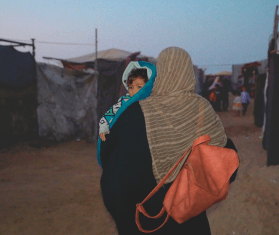The town of Koro, in central Mali, is facing an influx of refugees and displaced people fleeing violence in the “Sahel three border zone,” which includes parts of Mali, Niger, and Burkina Faso. Local authorities estimate that more than 100,000 people are seeking refuge throughout the Koro area, and this number far exceeds the capacity of host communities to help them.
In response to this crisis, Doctors Without Borders/Médecins Sans Frontières (MSF) has sent a team to support the central community health center in Koro to provide free medical care to refugees, install water points in the town, and build latrines.

“Our activities far from cover all the needs,” says Jonathan Tumbwe, MSF coordinator in Koro. “The number of patients consulted at the central health center where we provide care has risen from 300 to more than 1,000 per month, the number of births from 10 to 37, and more than 15 children suffer from severe acute malnutrition out of the total number of children screened each month.”
Some refugees are living with host families, while others struggle to pay monthly rent because they can’t make a living. There are also many other refugees who have no shelter and are exposed to the elements, and lack food and as well as essential household items.
Aminata
Aminata fled her homeland on the border with Mali. Today she is a refugee in Koro with her family after escaping a massacre in her village by armed men.
We were in our village when armed men came. We don't know who they were. They started shooting at people. Some managed to escape and others died. Among those killed were women, children, and our husbands. We fled to come here to Koro. We didn't bring anything, we don't have any food, we pay the rent. We can't stand it! Of course, we get help, but it’s not enough to pay the rent.
We can't go back to our village. If the war ends, we'll try to move to another village. Where we were is now decimated, we can't go back. Our village has been turned into a tomb; we can't live there again.

As more refugees arrive, needs increase
In the Bandiagara region, where Koro is located, MSF has set up projects to provide emergency medical and humanitarian assistance to people affected by armed conflict by supporting the hospitals in Koro, Bankass, and Bandiagara to deal with influxes of wounded people. MSF teams also provide protection and mental health treatment. At community level, MSF teams are working in the health centers of Diankabou, Dioungani, Mory, and Baye, as well as in 14 essential community care sites, to provide basic curative and preventive care to the community and refer patients to care facilities.
MSF teams are currently re-evaluating the intervention strategy to see how to increase the level of response in the face of growing demand. As more refugees arrive in Koro, the needs increase.
The first refugees began arriving in May 2023, and this wave intensified during the first half of 2024.
In July, MSF teams counted some 82,000 refugees in the town of Koro. The National Commission in Charge of Refugees (CNCR) was able to register 46,128 refugees in September and noted that there are still more than 11,000 people waiting to be registered.
“We are asking for food assistance for all the refugees to prevent malnutrition and to build shelters for them,” says Tumbwe. “It is not right that people who are already vulnerable and in need of help should have to pay rent.”

A shortage of water and shelter
Even before the current crisis, Koro had a recurring problem of insufficient supply of drinking water. The arrival of refugees has increased the demand for water, further exacerbating the shortage. There is also a shortage of available housing.
“This is the first time that the town of Koro has received more refugees than the local population,” explained a local authority. “For those who know Koro and its water problems, the arrival of the refugees makes access to water even more difficult for the whole town, and also creates issues of providing shelter. Among the 63,000 families of refugees, only 1,200 households have received two months’ worth of food aid, and only 1,000 people have received cash from the other organizations present.
“The need for water has largely been solved by MSF, which has installed water points in the town to facilitate free access for all refugees,” he adds.
Balkissa
Balkissa fled her village in a neighboring country. Today, she is a refugee in Koro with her children and husband.
When I fled, I was 5 months pregnant. I took a motorcycle taxi to Koro. On the way, I had a stomachache, and I was afraid of losing my baby. We fled the village at 3 a.m. and we were scared on the road. As soon as we arrived in Koro, I went for a check-up and was given injections, which eased my pain. A few months later, I gave birth to my child, who is now 3 months old.
When we arrived, we stayed with a host family. Then we were moved to another house that has no door and when it rains, the courtyard turns into a puddle, and we are flooded.





